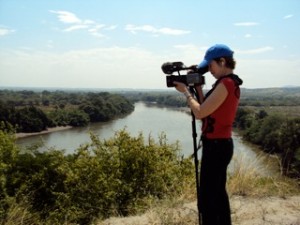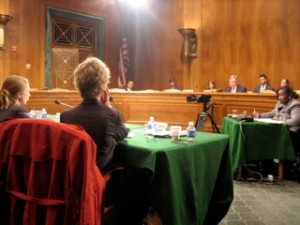Welcome to the second part of our Inspirational Interview with award-winning film-maker, Lisa F. Jackson. You can read Part One here.

1. When you make your documentaries about violence against women, how do you walk the fine line between showing audiences the truth and making it palatable enough for the message to sink in?
Part of the job is to find characters that embody a message. In The Greatest Silence for instance, it was Dr. Mukwege, a doctor who ran the hospital where hundreds of women came to have their mutilated bodies repaired. The other character was the policewoman – Major Honorine Munyole.
I think these are two great characters: Congolese citizens who deeply care about their country, the women in their country, and what was happening in their country. They cared about justice, they cared about maternal health, and they cared about ending the brutality. It gives you a sense that all is not lost and without characters like that to embody hope for the future, a film in the Congo would have been just relentlessly depressing. You have to have characters who, when the film is over, you can still think about and imagine them moving forward and making things change.
2. Rape and sexual assault are still taboo topics (or at least, difficult to talk about) in many cultures and communities. How do you get rape survivors and other parties involved to talk on camera about their experience?
It’s difficult but I think that most human beings want to be able to own their own narratives. In other words, they have gone through tragedy, experienced some sort of violence and it is important for them to be able to articulate that and to be able to have others bear witness to what they have experienced. I am myself a survivor of sexual assault and in the Congo particularly I shared my story with all the women that I met because I really felt strongly that if I was going to ask them to revisit a nightmare I had to be prepared to do the same thing. And it established an open line of compassion and communication – if they know that you have some idea of what they’ve suffered and share that with them, they’re more likely to be open in talking about it.
I was told so many times that I would not be able to find women who would talk to me but they would actually line up – when I came to this one village – to talk to me and I would film them until there was no more light. Women would wait for two, three or more hours with their children, just waiting to tell me their stories.
3. What advice would you give to aspiring filmmakers who may be in interested in using film as a medium of advocacy to end violence against women?
I would say that the stories are all around them. It’s very important to share the context. For instance with the Sex Crimes Unit film I thought it was very important to show how prosecutors in this country had fought for years to change the laws regarding how you prosecuted sexual violence. That change was part of the women’s movement too, so I thought that context was vital. With the Congo film I thought it was very important to tell some of the country’s history.
I think young filmmakers often take stories that are too big. There is violence all over the Congo but you need to find a smaller story that stands for the whole, and not try to cover the whole story. You have to find two or three characters that become the microcosm.

4. Tell us about the projects that you are currently working on or will be working on in the near future.
Right now I’m developing a film about the current political climate and the assault on women’s reproductive rights, specifically in Texas, Arizona, and other states where the funding is being cut off for women’s health clinics and where denying a women’s access to birth control and family planning has become a part of a Right-wing agenda. (At the time of this interview) I have a presentation with Planned Parenthood on Monday. Planned Parenthood is the main provider of reproductive healthcare in the country. One out of five women in this country uses Planned Parenthood and there are many states where the politics are trying to shut down that vital lifeline.
I want to see through the eyes of the women who use these clinics, and I want to ask why, after forty-five years, suddenly things that were never subject to debate – ie. a woman’s decision to have children or not – are now part of a political agenda. It should not be happening. That’s my next film project. Hopefully we’ll get the access we need – I want to shoot it here in New York and also in a small town in Texas, and we’ll probably shoot for about six months, so hopefully this time next year we’ll be finishing the editing.
5. In your opinion, how can people help stop violence against women in their communities, cultures and societies?
Well I think the first step is acknowledging that it’s happening. It’s a war against women that is happening in this country (the United States) – these clinics being forced to shut down. Some people would not see it as a war, but it’s a kind of political violence against women. I see it that way and I think many millions of people do see it that way, particularly the women who are being affected.
So I think the first step is to recognise that there is violence against women in your community, whether it is domestic violence, economic violence, whether it’s social violence, political violence – it takes so many different forms and some of it is so much a part of the way we live that we’re oblivious to it. And I think that the first step is to recognize it.
Another step is to educate women – and I don’t mean that in a condescending way – but to educate them about the violence that is being committed against them. Some of the women whom I talked to (in the Congo) felt that it was their fault that they’d been raped, or they felt that they were the only one. When I finished the film I took it back to the Congo to show it to all the women who were in it and every one of them said that it made them feel less alone.
Violence can be a very isolating and sometimes women don’t realise that first of all, they are not responsible for what is happening to them – that there are other forces at work – and second, that they are not alone, and that they have the power to stop it. Maybe not one woman against a soldier who has a gun – but many women. It’s the power of the multiple.